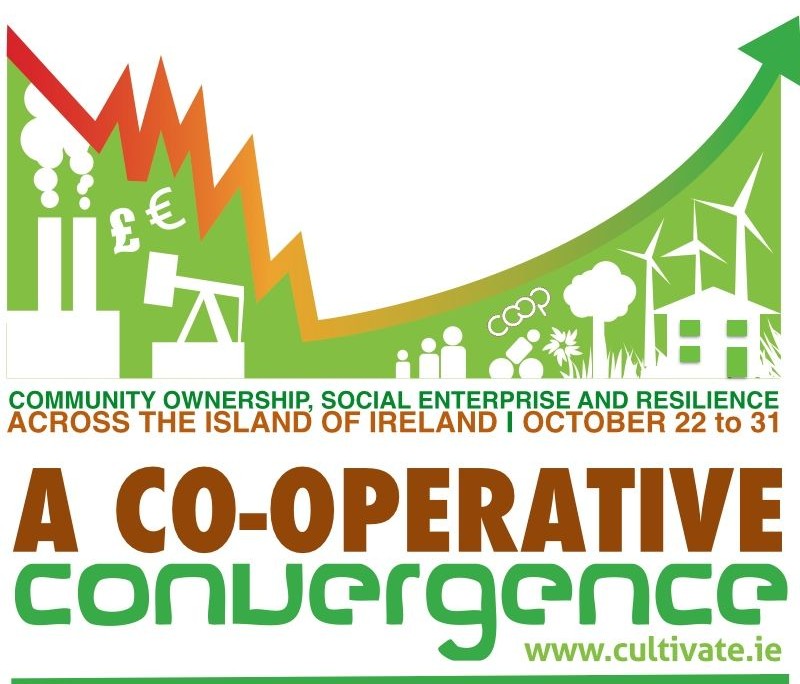
Join the Co-operative Convergence: Learn about co-ops in Northern Ireland
There has been a rise in the number of enterprises setting up as co-operatives as a response to austerity and the banking crisis – and now two events in Belfast that are part of Co-operative Convergence in October will explore this new trend and discuss why it is happening.
In the past three years, more than a dozen new co-ops have been set up across a range of sectors in order to give members more control of the enterprise, to share skills and knowledge among communities and to source new ways of raising finance such as Community Shares.
On Tuesday October 20th two local events that are part of the all-Ireland Co-operative Convergence celebration will show the range and diversity of Northern Ireland’s co-ops and how an alternative economy is emerging as a response to the financial crisis.
Co-operative Convergence will include events, workshops, talks, tours and more both North and South from mid-October to the start of November. “This is the first time that this well established festival, organised by Cultivate since 2000, is working with Co-operative Alternatives and we are pleased to feature Belfast in this all Ireland display of co-operatives and community owned initiatives in Dublin, Cork, Tipperary, Limerick and Galway,” said Jo Bird, of Co-operative Alternatives.
In the afternoon, we will host a half day Study Tour where participants will be whisked across Belfast to visit and hear from a range of groups (to be confirmed) including: Belfast Teachers Credit Union, Boundary Brewing, Belfast Cleaning Co-op, Northern Ireland Community Energy (NICE), the Creative Workers Co-op and Lunasa Café. There is also an option to stay on after the tour at Lunasa for refreshments.
“A co-operative business model is flexible and it works across many sectors. Core to co-operatives is the membership and their community – a co-operative relies on a collective sharing of knowledge and skills, resources and can lead to greater long term resilience. All over the world there is a pattern of new alternative economic models because people want more than financial gains – whether that’s greater social impacts, more environmental returns or more participation in decision making” explained Tiziana O’Hara from Co-operative Alternatives.
Co-operatives have been around for many years – many are agricultural co-ops set up in the early 1900s and these are some of the biggest co-ops. In the 60s and 70s, credit unions were set up and there are now more than 170 here. But from the 1990s until the recession, the co-operative model fell out of favour.
Since 2012 this has changed with an increase in support from Co-operative Alternatives and an emergence of individuals wanting to set up enterprises that do business differently.
The Creative Workers Co-operative, one of the enterprises on the tour, formed in 2012 as a small business providing print and web design, film and photography and has three members. Colin Stewart explains why the trio came together as a co-op: “We had all experienced precarious work, long hours, low pay, low job satisfaction and lack of job security that are common in traditional employment. We had conversations amongst ourselves about an alternative and more democratic working life.
“We had a skill set and interests that were not being utilised with our current work and we understood that an attempt to move into the creative industries would have meant freelancing or internships for larger companies that produce little social value; which none of us were keen on. The idea of a co-op appealed to us, we could do it ourselves and on our own terms. We could nurture and share skills as a co-op and make the decisions that affect our working lives ourselves. This meant working with like-minded organisations, such as other co-operatives, community groups and trade unions to bring about social change. Our collective background in political and community activism helped us create employment that was fair for us as workers but also our clients.”
The second event as part of Co-operative Convergence will be held in the evening, from 6-8pm, as Co-operative Alternatives has organised a public meeting discussing co-operative responses to austerity.
“We have much to learn from co-operative and popular responses to austerity from countries like Greece, Spain, Italy and Argentina. Co-operators there have a lot of experience in alternative models such as alternative currencies, food distribution and recovered factories. We plan to have a range of speakers and stimulate the emerging debate on the meaning of a co-operative economy” explained Jo Bird from Co-operative Alternatives.
To book places on the October 20 events go to www.coopconvergencebelfast.eventbrite.com

 Recommended Reading: Fresh off the press!
Recommended Reading: Fresh off the press!